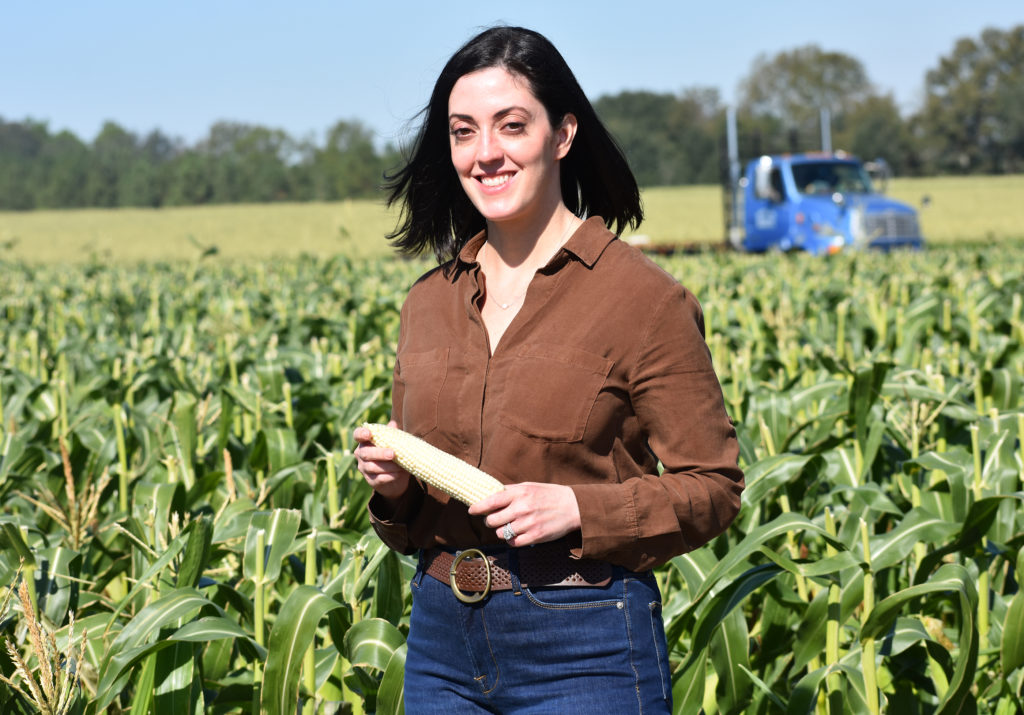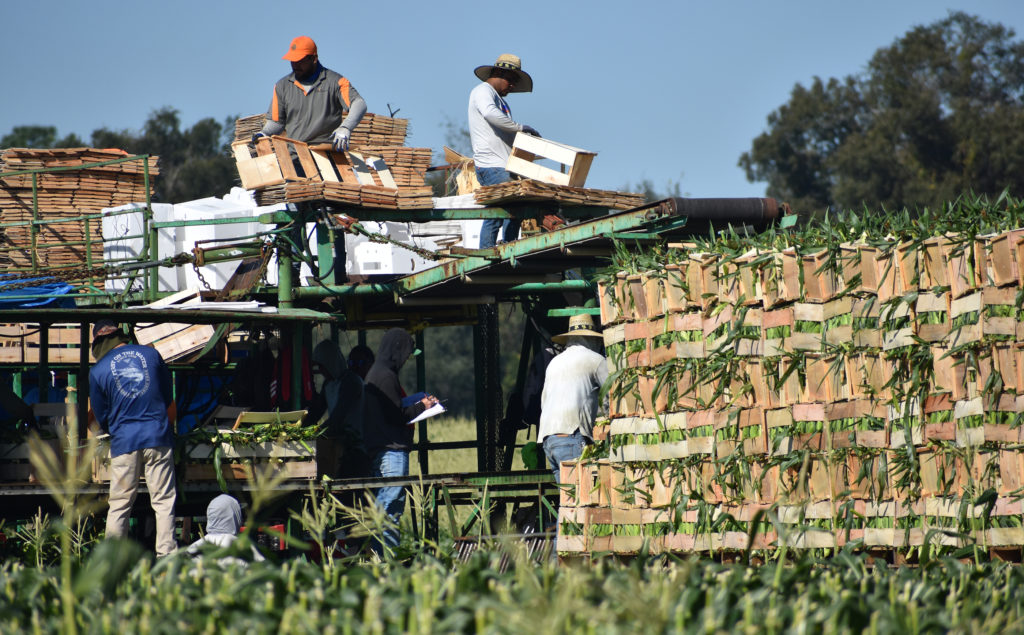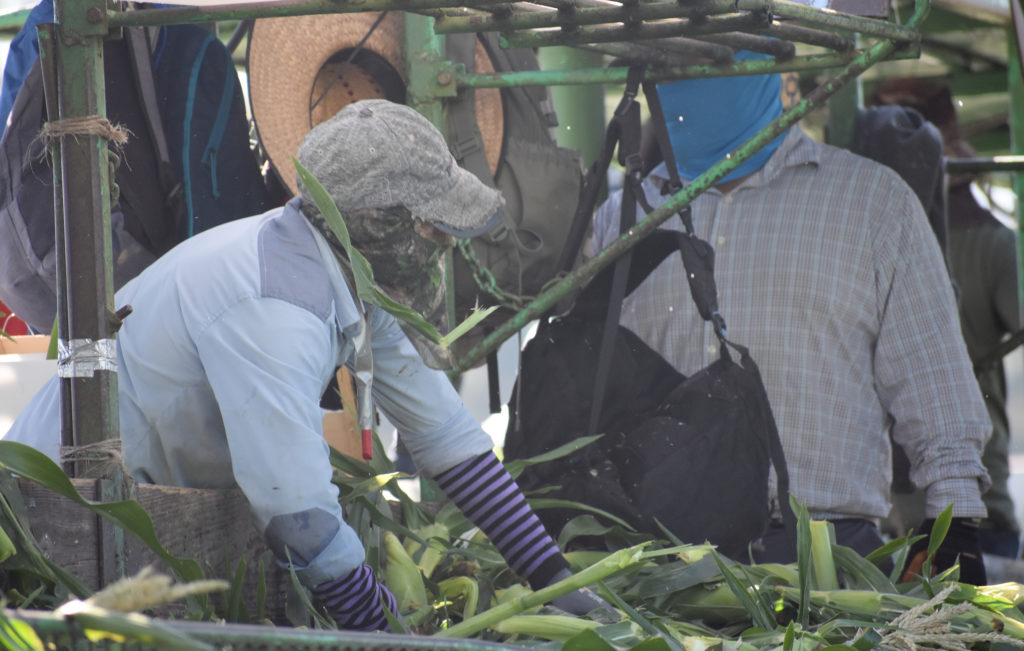By Clint Thompson
Karla Thompson is a lawyer by training and farmer by marriage. That combination makes her one of the Southeast’s leading advocates for growers.

“I think with advocacy work it really helps because I understand the misperceptions and ideas that people have about the ag industry because I had them myself,” Thompson says. “Before I got involved in the business, I thought of farmers as one-dimensional, just a guy on a tractor kind of thing. I’ve learned we are a lot of different things. We’re business people, scientists and salespeople. We’ve got a lot on our plate all at once.”
Thompson wasn’t indoctrinated into the agricultural industry until 2016 when she and her husband, Aaron Thompson, moved back home to Mitchell County, Georgia. She now works as vice president of J.E.T. Farms, a third-generation farm named after Joseph E. Thompson Jr. (Aaron’s father). The farm produces mostly sweet corn in the South Georgia and South Florida regions. Thompson’s legal background and propensity for wanting to assist the industry helped her quickly become a vocal supporter for farmers everywhere.

EDUCATING CONSUMERS
“My father-in-law will say farmers need to get better at public relations. I think that makes a lot of sense,” she says. “We are so busy in our day-to-day work that we forget that people don’t really understand what we’re doing. Any opportunity we have to invite them in and open up the process a little bit, I think people are excited to find out about it.”
Thompson’s advocacy starts with educating consumers, whether it be through farm tours or legislative visits. They provide different opportunities that make people more aware about the challenges farm families like hers encounter every year.
“Everybody’s so excited and so surprised about what they find out. I think the more that we can share our story, the more it really does engage people and makes them look for those Georgia blueberries or that Florida sweet corn,” Thompson says.
She testified in a hearing held by the Senate Committee on Agriculture, Nutrition and Forestry on June 9, 2022. The discussion highlighted rising imports and their impact on Georgia producers. Thompson testified about how the current trade policy is impacting growers like herself. Even though she represented the U.S. Peanut Federation, her affiliation with blueberries, green beans, sweet corn and sugar cane allowed her testimony to have a far-reaching impact.
“Our farm reflects an increasing diversity in southeastern agriculture. We have row crops and specialty crops. Trade issues impacting our farm range from non-tariff trade barriers to seasonal imports on fruits and vegetables that decimate our prices,” Thompson testified.
It was another teaching moment and part of Thompson’s relentless pursuit of educating America about how and where it gets its food.
Chris Butts, executive vice president of the Georgia Fruit and Vegetable Growers Association, is appreciative of Thompson’s efforts. “I think with her background in professional training and experience as an attorney, it’s clearly a different perspective that she brings to the industry and more so just a willingness to engage,” says Butts. “She’s already been up to D.C. and testified before a committee. She provides a really fresh perspective and has developed a keen understanding of the issues. She has a willingness to roll up her sleeves and jump right in. We’re really grateful to have her.”
Much of why Thompson is passionate about the future of farming stems from the obstacles growers face every production season.

H-2A CHALLENGES
The challenges that sweet corn producers have start with finding and utilizing a labor workforce to pick the crop. J.E.T. Farms produces a sweet corn crop in the spring and fall in South Georgia and South Florida. It utilizes three crews between the two regions in the spring, equating to about 150 workers, and one crew in each region in the fall, equating to about 100 workers.
Her family’s business utilizes the H-2A program to locate nearly 250 workers every year for their fall and spring sweet corn crop, which is all hand harvested. A domestic workforce is not even an option.
“We’ve pretty much gotten to the point where we can’t harvest if we don’t have H-2A crews,” says Thompson. “But with that said, the regulatory landscape of H-2A is really intense. I’m a lawyer, and you almost have to be in order to deal with the H-2A program. Even if you are coming at it with the best intentions to really honor your workers and do everything right, the legal scheme is so complicated that you could step out of line without even meaning to.”
The costs associated with the H-2A program almost become cost prohibitive in growers being able to use the program at all. Producers have to pay for their workers’ transportation, housing and the wage rate for doing the job they are contracted to do. It even has a trickle-down effect on a company’s domestic workforce as well.
“If we have H-2A workers performing the same jobs as our full-time domestic employees, our domestic employees have to be paid the same amount or more. If the H-2A wage goes up, then so too does the domestic rate,” Thompson says. “It can be someone that just got on a tractor for the very first time and they are making the same amount as a skilled laborer.”
IMPORT PRESSURES
Other challenges stem from rising imports and unfair trade practices from competing countries. Thompson has seen this firsthand with her family’s blueberry business. J.E.T. Farms produces about 13.5 acres of blueberries. An attempt to diversify with the potential to expand has succumb to imports that are only worsening from Mexico.
“With the blueberries, they’re used to be a time when the growing season began in Florida and came into Georgia and moved up the coast. Georgia used to be positioned at a time in the market when we were some of the only growers to have fruit. We could weather the oversupply times and low prices because we knew we would hit this window where we could get a good price,” says Thompson. “Now, Mexican imports are flooding the market. We can’t compete. There will be times we have to decide whether to take a loss and harvest, because we can’t afford the cost of harvesting or let the literal fruit of our labor rot in the field. It’s really heartbreaking because that’s the work that we put in. It’s even worse when there are families in need of fruits and vegetables at a good price.”
One source of the unfairness associated with imports stems from Mexican growers backed by government subsidies. They pay a microscopic minimum wage rate compared to the United States. As a result, they can afford to sell their produce at a much lower rate.
“Because of the way their system is set up, the more that (Mexico) makes from their competitive advantage, they can just feed that right back into their technology and right back into their land. It just snowballs,” Thompson says.
These labor and trade issues that the specialty crop industry must overcome have had the Thompsons contemplating their own agricultural mortality.
“We think about it all the time. We always say, ‘I don’t know how much longer we can keep doing this the way that we are. Something has to change. There’s only so much that we can do on our level to adapt to the situation,’” Thompson says.
“I think at some point there is a love that’s developed for it. I have a different perspective, because I did not grow up on a family farm,” she explains. “I got this rare opportunity to be dropped into this third-generation family farm. One thing that’s so unique about farming is that you can stand behind your product 100% of the time. In law, there’s a winner and a loser, and sometimes you can have ambivalence about what you’re doing and whether it makes an impact. With farming, especially fresh fruits and vegetables, you are literally nourishing people with what you do. When you put your head on your pillow at night, if nothing else, you’re helping someone else with what you’re doing.”









